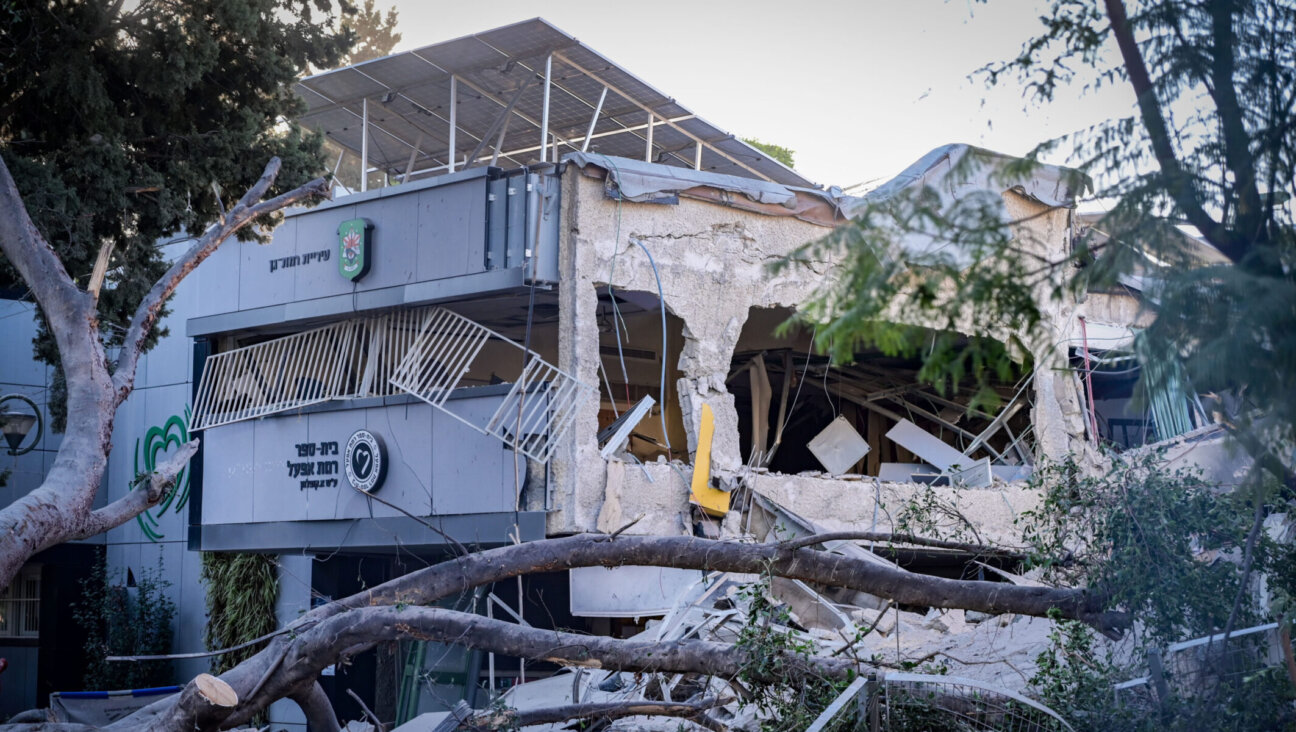Here’s Why It’s So Hard For The Government To Stop Violent White Nationalists

A man makes a slashing motion across his throat toward counter-protesters as he marches with other white nationalists, neo-Nazis and members of the ‘alt-right’ during the ‘Unite the Right’ rally in Charlottesville, Virginia. Image by Getty Images
The shooting Saturday at the Chabad of Poway synagogue in California appears to be the latest example of the rise in violent right-wing extremism in America. A manifesto released online shortly before the shooting, and believed to have been written by the suspect, praised the alleged gunman behind last year’s Pittsburgh synagogue massacre, which killed 11.
According to the Anti-Defamation League, the number of extremist-related murders surged 35% in 2018, with all 50 incidents conducted by right-wing extremists. A dramatic increase in anti-Semitic and Islamophobic hate crimes was also seen between 2015 and 2017, according to the most recent FBI statistics.
While the Democrat-controlled House of Representatives has begun conducting a series of hearings on this issue and the government’s response, violent white extremism continues to be a concern: FBI Director Christopher Wray told Congress last month that such groups are a “persistent, pervasive threat.”
Here’s why the government has struggled to combat this issue:
Lone wolves are anonymous and difficult to stop:
The attacks in Pittsburgh, New Zealand and now Poway have been random-seeming acts of violence by so-called “lone wolf” attackers, working outside of any terrorist organization, but connected by a shared extremist discourse. In the case of Poway, the shooter’s manifesto explicitly cites the Pittsburgh and New Zealand suspects as inspiration, and the Poway and New Zealand manifestos are similar in content, format and tone.
White supremacist groups like Identity Evropa have fallen apart as members’ secret identities have been revealed due to their exposure in public marches – so the sharing of information has mostly gone online, to chats on Discord and message boards like 8chan, where they can hide behind anonymous user names.
Organizations like the ADL, as well as Antifa-tied groups, have succeeded in identifying some of these people – and in the ADL’s case, report them to the police before their threats of violence were realized.
But as recent, prominent terror attacks in Los Vegas, Orlando and Boston showed, it’s very difficult to prevent an attack if the perpetrator doesn’t share his plan with anyone else in advance. And the Poway manifesto urges others not to post about any attacks before carrying them out.
The Trump Administration and other Republicans have not made it a priority:
Soon after the Trump administration took charge of the Department of Homeland Security, it gutted the working group in charge of fighting domestic radicalization and revoked a six-figure grant to an organization that works to de-radicalize former white nationalists, instead concentrating solely on domestic Islamic terrorism. Democrats have been reluctant to push for restored funding for de-radicalization programs because they don’t trust the Trump administration to spend the money as directed, a House Democratic aide told the Forward last month.
Indeed, Trump himself has questioned whether white nationalism is an issue. When asked by a reporter hours after the New Zealand mosque attack if white supremacist terrorism was a threat, Trump replied, “not really.”
Congressional Republicans have expressed similar nonchalance. They did not hold any hearings about white nationalism from 2017-2019, and when Democrats took the House and scheduled their first such hearing in the House Judiciary Committee earlier this month, the Republicans invited right-wing activist Candace Owens and used most of their time to ask her questions about hate on the left.
The House Homeland Security Committee will hold another such hearing on May 8, months after chairman Bennie Thompson complained that agencies were “stonewalling” him in an attempt to get a briefing on the issue.
“Domestic terrorism” isn’t a federal crime:
While the Pittsburgh gunman and other similar actors have been charged with counts of federal hate crimes, they haven’t been categorized as terrorists – because there is not a federal law against domestic terrorism. The Jewish Council of Public Affairs, the umbrella group for Jewish community relations groups nationwide, is one group calling for a domestic terrorism law – “not instituting a list of domestic terrorist groups (which would likely violate the First Amendment), but rather codifying domestic terrorism as a crime, mandating data collection, and providing for local law enforcement training,” JCPA president and CEO David Bernstein said in a statement to the Forward last month. “We also urge Congress to establish a new interagency task force on countering violent extremism.”
As Mary McCord and Jason M. Blazakis explained last month for Lawfare, a national security blog published with the Brookings Institution, the current crime of “providing material support to terrorists” is applied to foreign groups and actors but not domestic ones; creating a domestic component of that law would also force the FBI to devote more resources to the issue. Only around 10% of FBI counterterrorism agents are devoted to domestic terrorism, according a 2018 analysis from the Brennan Center for Justice.
The lack of a current domestic terrorism law has already had ramifications in one high-profile case: Christopher Hasson, a self-described white nationalist Coast Guard officer who was arrested with a large weapons stockpile and an alleged “hit list” of prominent Democrats and journalists, is likely to soon be released from prison to house arrest because, the president judge explained, he wasn’t charged with any terror-related offenses.
Tech companies don’t always step in:
Social networks have long been acknowledged as a central place for extremists to meet others, and to get further radicalized by outrageous content. At the House Judiciary Hearing, representatives from Facebook and YouTube pledged to support law enforcement efforts and to remove any content that violates their terms of service.
But at least according to one major firm, the line between extremist rhetoric and “acceptable” discourse is pretty thin: As Vice reported last month, an engineer at Twitter told colleagues at an all-hands meeting that they had refrained from creating a powerful algorithm to sweep up white nationalist content as their had with ISIS-tied posts, because any program used to filter out white nationalist rhetoric would inevitably affect conservative political figures as well.
Aiden Pink is the deputy news editor for the Forward. You can reach him at [email protected]
A message from our Publisher & CEO Rachel Fishman Feddersen

I hope you appreciated this article. Before you go, I’d like to ask you to please support the Forward’s award-winning, nonprofit journalism during this critical time.
We’ve set a goal to raise $260,000 by December 31. That’s an ambitious goal, but one that will give us the resources we need to invest in the high quality news, opinion, analysis and cultural coverage that isn’t available anywhere else.
If you feel inspired to make an impact, now is the time to give something back. Join us as a member at your most generous level.
— Rachel Fishman Feddersen, Publisher and CEO
























